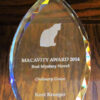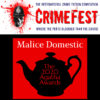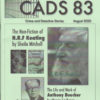A Kind of Light by H.R.F. Keating, Audible Studios
Five years after the death of acclaimed author and friend of our Society, H.R.F. Keating, a new Keating novel has been published. Available only in audiobook form for the time being, the novel can be downloaded through Amazon’s Audible website. It features a foreword from Simon Keating and an introduction from the biographer Michael Holroyd. The novel is read by Keating’s widow, the actress Sheila Mitchell; her impressive vocal skills are a huge asset for this initial publication format.
‘A Kind of Light’ is a novel that draws significant influence from the work of Joseph Conrad, and in particular Conrad’s novella from 1899, ‘Heart of Darkness’. The parallels are obvious: both stories follow their protagonist’s journey up the Congo River into the wild heart of Africa, and both explore themes of corruption, colonialism, and the juxtaposition of civilisation and savagery with all its inherent hypocrisies. Keating’s title is a direct quotation from Conrad’s text.
Keating’s novel combines twin storylines separated by a hundred years. In Victorian times, Thomasina le Mesurier, a gentlewoman and the daughter of a Salisbury clergyman, undertakes an intrepid mission to find and retrieve a miraculous plant from deep in Africa’s tropical forests. In the 1980s, two documentary film-makers retrace her steps in the hope of discovering the missing records of her adventure. These twin stories provide a view, a century apart, into the history of this troubled and exploited part of Africa.
The strongest part of the storytelling, for me, lies in Keating’s attention to detail. This bears rich fruit with his evocative and vivid depictions of Africa’s various settings. The sights, sounds and smells provide a palpable backdrop to the story.
Over the years, ‘Heart of Darkness’ has received both accolades and criticism. As a story it is a product of its time, even as some of its themes resonate today. In ‘A Kind of Light’ Keating has examined those themes through a more modern lens. While he offers no answers to the questions, no solutions to the problems, the conflicting ideas remain thought-provoking and compelling nonetheless.
The Dorothy L. Sayers Society Bulletin





